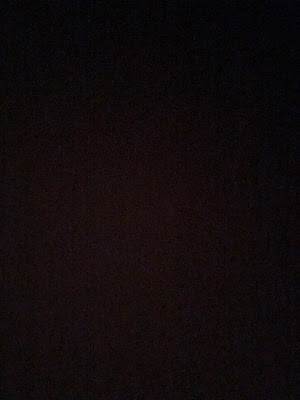A few weeks ago, Grey and I found ourselves sitting in the dark. The blackout came suddenly, leaving every house that didn't have solar panels in darkness for a couple of hours. Sitting in the dark triggered the memory of the first blackout I remembered, leading to a conversation with Grey.
It happened when I was a child living in a small southern-Minnesota town. I don't know what triggered the blackout (I suspect a storm) or how long it lasted. What I do remember was that it was so dark that the window looked blindingly gray. It was seeing the gray that caused me to panic, feeling disoriented and desperately searching for any point of light to make sense of what I was seeing.
As Grey and I waited for the power to return, we debated this memory. "Dark is dark," he argued. The absence of light is black. And yet, once the power returned, we both learned that the brain is a funny thing, where it isn't black that most people see in perfect darkness, but a dark gray color that is the result of visual signals for the optic nerve. Humans actually need a bit of light in order to see darkness.
I've been thinking about eigengrau in relation to how most people have been weathering the COVID pandemic. Pandemic fatigue is very real, with many unaware of the extent they are suffering from it. But another level has been watching how so many around me struggle with parsing information (and misinformation) coming at them throughout this crisis. As a scientist, this parsing, assessing, challenging and constant re-evaluation is something my training prepared me for. I'm used to questioning everything that comes my way, particularly when the information is coming from trusted sources as I'm well aware of my echo chamber. And yet, this past year has reminded me that most people don't have this skillset, leaving them disoriented when trying to figure out how to navigate our world.
The results have been the politicization of science, with people overly confident to effectively assess risk and harm. Relationships have been fractured, lies buried in half-truths have spread like wildfire, and distrust has grown. It's widespread and across educational classes. And it's been surreal to watch as I've also had my eyes on the data coming out about SARS-CoV-2 and how it weaponizes people's immune systems. Seeing the data on how exactly people are dying is sobering.
"Paradoxically, people need light to see darkness." This one statement has haunted me since I first read it and I'm beginning to understand the wisdom in this. Last year, our world was plunged into darkness. And those that were tasked with leading us out proved how incapable they were to do so. Those that have been the voices to advise these leaders either have been ignored, silenced, or have lied. All of it leading to disorientation and panic, combined with chronic fatigue. What is clear is that we need someone to show us the light. And we need that individual or groups of individuals to do so while pointing out the darkness.
Make no mistake: COVID-19 is real. I don't care if you have gotten the virus and came out okay, because others are dying or are very much at risk. Plus we don't know what the long-term effects of infection are (I suspect we will see a spike in infertility globally, as our immune systems are directly linked). But equally dangerous is this being plunged into darkness without any pinpoints of hope for finding one's way out. After living a year in lockdown and a pseudo-Zombieland, it's hard to ignore the impact.






Thank you for this. And all the information you've passed our way this year. But especially for this.
ReplyDeleteI'm gobsmacked (in a good way) by the thought that humans need a bit of light to see darkness. OMG, I love this (you know me, the BothAnd girl, always trying to bring opposites together).
ReplyDeleteThank you for sharing your thoughts on this. The way you framed us trying to find our way out makes so much sense.
Interesting! It's still pretty dark here at the moment -- third lockdown in a little over a year now underway, while vaccination rates continue to chug along. But I did get my first shot earlier this week, which did give me some hope. :)
ReplyDeleteThank you for being a source of light for us over this past year!